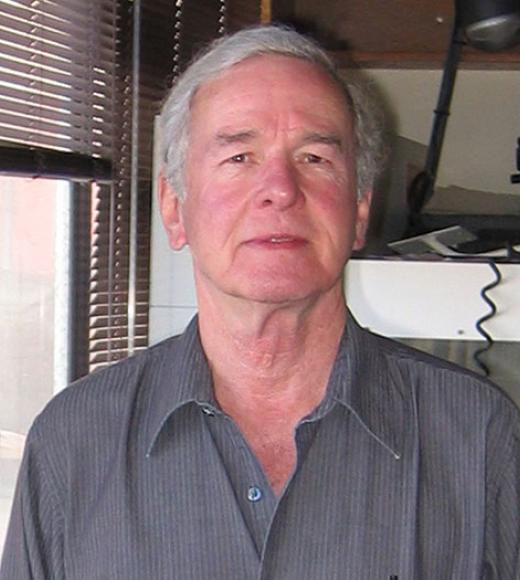
Position Title
In Memoriam
Professor Emeritus
- College of Biological Sciences
- Molecular & Cellular Biology
- Bodega Marine Laboratory
University of California Davis, Bodega Marine Laboratory, PO Box 247, 2099 Westshore Rd, Bodega Bay CA 94923
In Memory
James Clegg, a renowned expert in cellular and molecular physiology, passed away at the age of 91 at his home in Bodega Bay. He was the director of UC Davis’ Bodega Marine Laboratory from 1985 to 1998, transforming it into a global hub for marine science and policy research. Known for his groundbreaking work on brine shrimp, Clegg's research had a lasting impact on aquaculture in developing countries. Colleagues and students remember him as a caring mentor who encouraged them to "follow their passion" and valued their personal success over his own recognition.
Read More in the Press Democrat
- B.S. Pennsylvania State University, 1955-58
- Ph.D. The Johns Hopkins University, 1958-61
Research Interests
My research involves biochemical and biophysical adaptations to environmental extremes. Part of my research interests involve extremophilic invertebrates (those who have the capacity to endure and in some cases flourish under conditions that damage most organisms). Although "extreme,” these organisms can be viewed as representing "the boundary condition" in terms of coping with such things as temperature change and other environmental parameters. Topics include:
- Stress proteins and molecular chaperones in invertebrates
- Organization of enzymes and metabolic activity in the aqueous compartments of cells
- The biochemistry of adaptation to temperature changes under more "physiological" conditions that are environmentally relevant
- Effects of changing atmospheric pressure on physiological and biochemical processes in marine invertebrates
Publications
Welch, G.R. and J.S. Clegg. 2012. Cell versus protoplasm: revisionist history. Cell Biol.Intern. 36:643-647.
Li. R., D-F Chen, R. Zhou, S-N Jia, J-S Yang, J.S. Clegg and W-J Yang. 2012. Involvement of Polo-like kinase 1 (Plk1) in mitotic arrest by inhibition of the Mitogen-Activated Protein Kinase -- Extracellular signal-Regulated Kinase -- Ribosomal S6 Kinase 1 (MEK-ERK-RSK1) cascade. J. Biol. Chem. 287:15923-15934.
Warner, A.H., Chakraboortee, S., Tunnacliffe, A. and J.S. Clegg. 2012. Complexity of the heat-soluble LEA Proteome in Artemia species Comp. Biochem. Physiol.D. 7:260-267.
Clegg, J.S. 2011. The unusual response of encysted embryos of the animal extremophileArtemia franciscana to prolonged anoxia. In Anoxia: Paleontological Startegies and Evidence for Eukaryotic Survival. (A.V. Altenbach, J.M. Bernhard, J.Seckbach, editors) Springer, Berlin, in press.
Clegg, J.S. 2011. Stress related proteins compared in diapause and in activated, anoxic encysted embryos of Artemia franciscana. J. Insect Physiol. 57:660-664 (symposium paper).
Hengherr, S., R.O. Schill and J.S. Clegg. 2011. Mechanisms associated with cellular desiccation tolerance in the animal extremophile Artemia. Physiol. Biochem. Zool. 84:249-257.
Jackson, S.A., K.R. Uhlinger and J.S. Clegg. 2011. Duration of induced thermotolerance and tissue-specific expression of hsp/hsc70 in the eastern oyster, Crassostrea virginica and the pacific oyster, Crassostrea gigas. Aquaculture 317:168-174.
Hengherr, S. R.O. Schill and J.S. Clegg. 2011. Mechanisms associated with cellular desiccation tolerance of Artemia encysted embryos from locations around the world. Comp. Biochem. Physiol. 160:137-142.
Clegg, J.S. 2010. Revisiting the Microtrabecular Lattice. Cell Biol.Int. 34:1105-1107 (invited review).
Welch, G.R. and J.S. Clegg. 2010. From protoplasmic theory to cellular systems biology: a 150 year reflection. Amer J. Physiol., Cell Physiol. 298:C1280-C1290.
Warner, A.H., O. Miroshnychenko, A. Kozarova, P.O. Vacratsis, T.H. MacRae, J.Kim and J.S. Clegg. 2010. Evidence for multiple group 1 late embryogenesis abundant (LEA) proteins in encysted embryos of Artemia and their organelles. J. Biochem. 148:581-592.
Salehian, S., B.P. Braeckman, L. Beladial, W. Bert, J.S. Clegg and J. Mertens. 2010. The importance of feeding status and desiccation rate in successful anhydrobiosis ofPanagrolaimus (Nematoda). Nematology 13(2):185-191.
